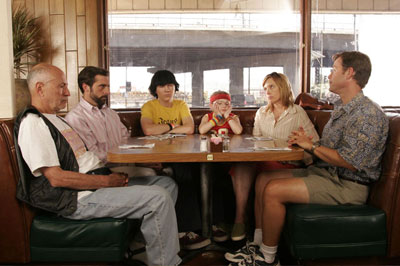
little miss sunshine. i've seen this movie twice at the theater and paid full price both times. nuff said? no children allowed (it's rated R for a reason) but it is very, very funny. mamaT, let me know when you can go with. i am ready to see it yet again. this family is painfully dysfunctional. it's the sort of dysfunction that would bring you to tears if it was your family, and i'd be a liar to say we don't have a few of these characters in mine, but it manages to make you laugh out loud most of the time because it's just so miraculously subtle and over the top at the same time. paul dano is flawless as an adorable angst ridden teen and abigail breslin is just plain adorable as olive. although an indie, it has a happy "hollywood" ending. go and see. now.
Are you talking about the same movie that Barbara Nicolosi wrote about here:
"the film spends a lot of time setting up the father of the family, played well by Greg Kinnear, as a total assh*le. He spends the whole film talking about the difference between winners and losers, and seems oblivious that he himself is a loser. This fact is obvious to his teenage son who describes living in the house as hell, and has dropped out from any interaction with the hypocritical jerk parents who feed and clothe him.
I don't find ridicule inspiring. I don't find it really humorous. I think it subverts what comedy should be. Comedy should make us feel humble. Ridicule leaves the audience feeling superior.
I don't think post-modernism is an excuse to break the Fourth Commandment. But, I know, lighten up, right?
- This same shaggy-haired teenage son wears a T-shirt that proclaims "Jesus Was Wrong", and makes the film's most profound philosophical speech declaring, "Going to college? F*ck that. Getting a job? F*ck that. Making a living? F*ck that. F*ck it all. F*ck everything."
Somewhere out there, I suppose Nietsche was very inspired. The audience I was with roared in approval. I didn't think it was funny. The moment was played as a profound epiphany. But it isn't really profound, is it? Don't tell the audience. They were ready to elect the character to Congress for speaking the truth. What truth is that?
I find this to be predicable of GenX and the Millenials: They say things alternately banal and profound, but they don't know the difference.
- a grandfather (played by the talented Alan Arkin, who must be really, really desperate for work) who is a cocaine addict and a sex addict. He buys porn and makes the film's most vulgar speech to his grandson, chastising the fifteen year old for not getting lots of sex, and then exhorting him to "have sex with lots of women. Lots of them. Not just one. Gets lots of sex."
Again, the audience was in stitches. Especially when the grandfather noted that in the rest home he used to live in, he got "third degree burns on my Johnson" from all the sex. The more the old man spoke filth, the funnier it got for the audience. But, I didn't think it was funny. I thought it was gross and shameful.
- a seven year old who does a protracted burlesque dance as sexualized as possible. Now, I get that the scene was meant to be satiric commentary on the whole little girl beauty pageant world. I get that. I just hated watching a seven year old do a strip tease. Or, using the film school jargon for which I paid thirty grand, I found the method of filmic satire, more problematic than the social ill it was critiquing.
Again, however, the audience was falling off its seat laughing at this scene. How funny for them to get to watch a seven year old actress mimic an exotic dancer? I didn't think it was funny. I thought it was perverse. I don't care what the filmmaker was trying to do. He doesn't get to use a seven year old to make his frickin' statement!
I would say those three moments are the vulgar lowlights of the film. The rest of it involves a family in which the father is an ambitious jerk. The mother is an impotent whiner. And, OF COURSE, the only really compassionate, intelligent and caring member of the family is the gay uncle Frank, who is recovering from having slit his wrists. (And he is the sane one.)
I found during the movie that the audience was laughing at moments in which the family's shame was particularly exposed. The humor was to point at the people in the family and sneer, "What an assh*le!" or "What a hypocrite!"
I feel absolutely sure that a legion of critics - and certainly Christians! - will passionately defend this film. They will relish its "fresh satiric critique " of post-modernity. They will say things about how wonderful it was for the family to end the film accepting each other in a stirring moment of loyalty and love. They will say that this movie is clearly just not my kind of taste, and that engaging culture means that we shouldn't get stuck on little things like vulgarity, profanity, crassness and the exaltation of meaninglessness.
They will be absurd. Swallowing camels of human degradation and straining out gnats of "niceness".
Pass on Little Miss Sunshine. It won't make you a better person. It won't make you love your neighbors more. It will fill your spirit with cynicism and sneering. Pass. Pass. Pass.